ETHOSUXIMIDE - ORAL
PHONETIC PRONUNCIATION: (ETH-oh-SUX-i-mide)
COMMON BRAND NAME(S): Zarontin
GENERIC NAME(S): ethosuximide
Uses
USES: This medication is used alone or with other medications to prevent and control a certain type of seizure (absence or petit mal seizure). It works by controlling the abnormal electrical activity in the brain that occurs during a seizure.
How to use ETHOSUXIMIDE - ORAL
HOW TO USE: Read the Medication Guide provided by your pharmacist before you start taking this medication and each time you get a refill. If you have any questions, ask your doctor or pharmacist. Take this medication by mouth with or without food, usually once or twice daily or as directed by your doctor. If you are using the liquid form of this medication, carefully measure the dose using a special measuring device/spoon. Do not use a household spoon because you may not get the correct dose. Dosage is based on your age, medical condition, blood levels of ethosuximide, and response to treatment. For children, the dosage may also be based on their weight. It is very important to follow your doctor's dosing instructions exactly. Your doctor will start you on a low dose and slowly increase your dose. It may take several weeks or months to reach the best dose for you and to get the full benefit from this medication. Use this medication regularly in order to get the most benefit from it. To help you remember, use it at the same time(s) each day. Do not stop taking this medication without consulting your doctor. Some conditions may become worse when the drug is suddenly stopped. Your dose may need to be gradually decreased. Tell your doctor if your condition does not improve or if it worsens.
Side Effects
Precautions
Interactions
Overdose
Images
Reviews
Faq for ETHOSUXIMIDE - ORAL
Ethosuximide is an oral medication that belongs to the class of drugs known as anticonvulsants. It is primarily used to control and prevent absence (petit mal) seizures in patients with epilepsy.
Ethosuximide works by reducing the abnormal electrical activity in the brain that leads to seizures. It specifically targets T-type calcium channels, which play a crucial role in regulating brain cell activity.
The common side effects of Ethosuximide may include dizziness, drowsiness, headache, stomach upset, nausea, vomiting, loss of appetite, weight loss, and mood swings. If any of these side effects persist or worsen, it is important to consult a healthcare professional.
Ethosuximide is usually taken orally, with or without food. The dosage is based on the patient's age, weight, and medical condition. It is important to follow the prescribed dosing schedule and not stop taking the medication without consulting a doctor.
Yes, Ethosuximide can interact with other medications, including other anticonvulsants, antidepressants, antipsychotics, and certain antibiotics. It is essential to inform the healthcare provider about all the medications, supplements, or herbal products being taken to avoid potential drug interactions.
Before starting Ethosuximide, it is important to inform the healthcare provider about any allergies, medical conditions, or history of mental/mood disorders. Ethosuximide may also decrease the effectiveness of hormonal birth control methods, so alternative or additional contraception may be required.
Ethosuximide is generally considered safe during pregnancy, but it is important to discuss the potential risks and benefits with a healthcare provider. It may pass into breast milk, but the risk to the infant is usually low. Again, consulting with a doctor is recommended before taking Ethosuximide while breastfeeding.
Disclaimer
IMPORTANT: HOW TO USE THIS INFORMATION: This is a summary and does NOT have all possible information about this product. This information does not assure that this product is safe, effective, or appropriate for you. This information is not individual medical advice and does not substitute for the advice of your health care professional. Always ask your health care professional for complete information about this product and your specific health needs.
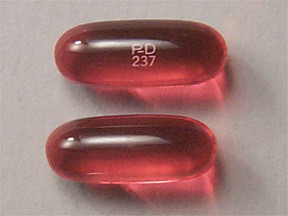
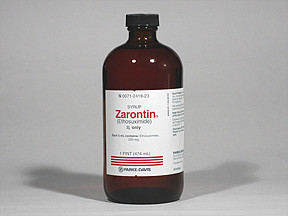
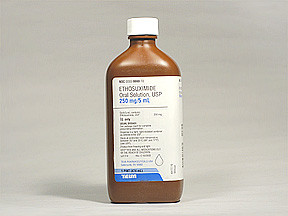
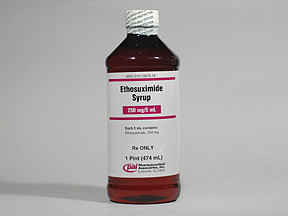
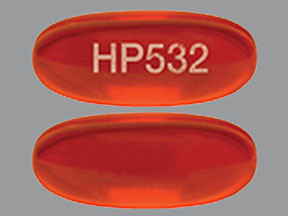
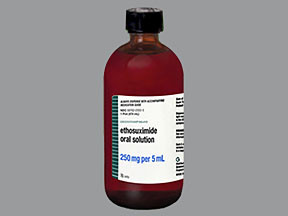
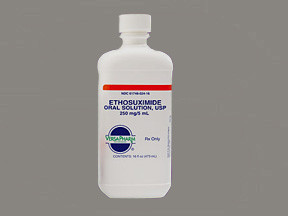
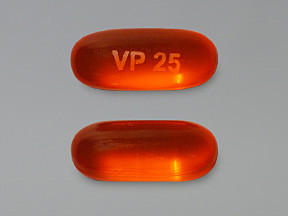
No Reviews Yet